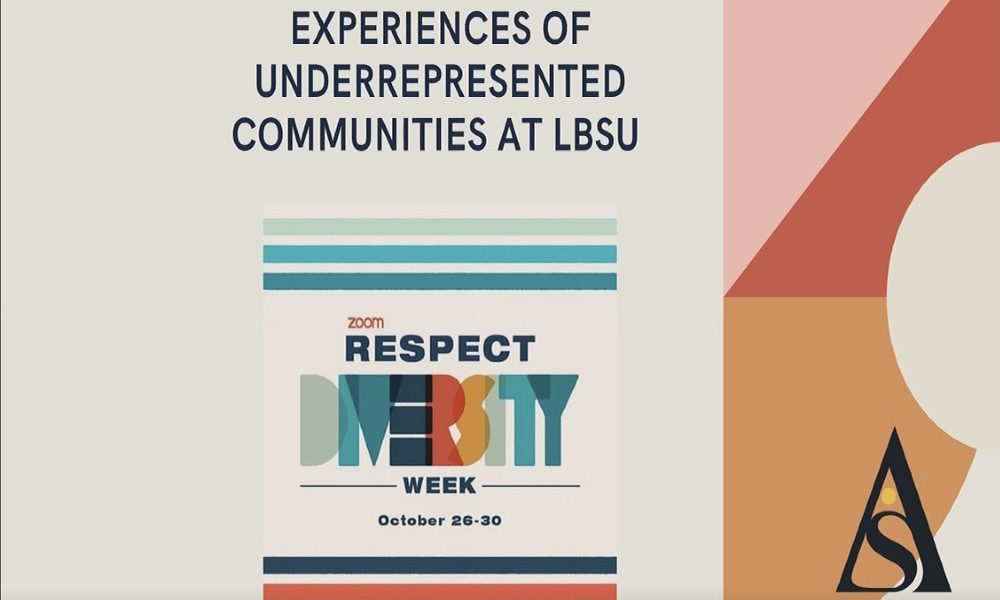Long Beach State’s Associated Students, Inc. held a panel of representatives from underrepresented and marginalized groups on Oct. 27 to discuss their struggles on and off campus as part of Respect Diversity Week.
The panelists included professors Danielle Kohfeldt of the Department of Psychology and Laura Gonzalez from the Department of Finance, as well as students Lauryn Westbrook and David Rowe.
The panel kicked off with each member introducing themselves and what community they represented.
Kohfeldt, who identified herself as chronically pained and disabled, according to ASI’s website, spoke on behalf of the disabled community.
Gonzalez is from Spain with Spanish and Basque roots, and said that her mixed background helped her have a unique identity in the U.S.
“When I came to the United States, I was an international student,” Gonzalez said. “So that’s the way I saw myself. Then when I transitioned from master’s to PhD, I noticed that I was seen as a Latina. And at that time, I didn’t know what to think.”
Westbrook, a fourth-year psychology major, spoke about her experiences as a Black woman at CSULB and said that by understanding Black history, she was empowered to figure out how she could contribute to her community.
Rowe, a fourth-year communications studies major, talked about how his Jewish identity had been evolving since he was young, and that he had been connecting to Judaism through his community.
“Being Jewish isn’t just a religion,” Rowe said. “In some ways, it’s an ethnicity. I think it mostly is a peoplehood.”
Each panelist was asked how their respective communities are viewed by people.
Kohfeldt discussed the different forms of disabilities and the stereotypes about the community, as well as normalizing the use of the word “disabled.”
Gonzalez found an approach to dealing with how she was viewed by others outside her community.
“I was basically not really doubting myself, but doubting of having the strength of overcoming the negativity… luckily I inherited two things: one is that I am very stubborn, and I persist and persist and persist,” Gonzalez said. “And the other thing is that I always sought allies. If there is one person I can find that believes in me, I am going to cling on that and work on my network.”
Westbrook explained how historically, Black people have been compared to white people, and due to differences in speech, music or hair, can be looked upon negatively. She said that there are a lot of similarities that the Black community has with the white community, giving them more in common than people think.
Rowe said that he resonated with Westbrook’s answer, and discussed how Jewish people have faced thousands of years of anti-Semitism. He spoke about the misconceptions of Jewish people manipulating and “running things behind the scenes” since the beginnings of Judaism, but expressed gratitude towards Long Beach for welcoming the Jewish community.
Panelists also talked about the barriers in higher education. The disabled community have troubles maneuvering around campus, according to Kohfeldt. She expressed issues with ableist policies on campus that affected students, such as mandatory attendance. Kohfeldt credited social media, colleagues and students for providing support to her and the disabled community.
Rowe said that like any place, white-passing members of the Jewish community have privileges that people of color do not. However, Rowe said that he and the Jewish community were able to find support within each other, celebrating Jewish traditions together and welcoming allies to connect with them.
Westbrook’s biggest challenge was her mental health, exacerbated while she was in college and was comparing her experience with her peers. When she decided to leave the University of California, Santa Barbara, Westbrook found support through her psychiatrist, EOP counselors, fellow Black students and her friends.
“Finding those communities, regardless of if it’s your home community, your close family, immediate family, or your cultural or ethnic group, or racial group, or a church group or anything like that, those are the people that I would definitely suggest reaching out to to find that support,” Westbrook said.
Respect Diversity Week continues through Oct. 30. Visit ASI’s website to register for future events.




